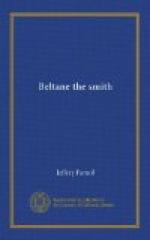“Burn down the gallows,” said Beltane, “’tis an accursed thing, so shall it shame earth and heaven no longer.”
“How!—how!” cried the ancient man, letting fall his rusty sword, “Destroy Black Ivo’s gibbet? Dare ye—dare ye such a thing indeed? Are there men with souls unconquered yet? Methought all such were old, or dead, or fled away—dare ye this, youth?”
“Aye,” nodded Beltane. “Watch now!” and hereupon he, together with the others, fell to hewing down the dry brush with might and main, and piling it about the gibbet’s massy beams, while the ancient man, perched upon a rock hard by, watched them ’neath his shaggy brows and laughed soft and shrill.
“Aha!” he cried, “the fire ye kindle here shall set the Duchy in a flame mayhap, to burn Black Ivo with Gui of Allerdale and Red Pertolepe—mayhap! For them, fire on earth and flame in hell—aha! To burn the gibbet! ’tis well bethought: so shall carrion kite and jay go light-bellied hereabouts, mayhap, oho! ‘Caw,’ they shall cry, ’Caw— give us to eat—fair white flesh!’ Yet how may they eat when the gallows is no more?”
Thus spake he with shrill laughter while Beltane laboured until the sweat ran from him, while Walkyn’s great axe flashed and fell near by and steel glittered among the underbrush that clothed the slopes of the hill.
Very soon they had stacked great piles of kindling about the gallows’ weather-beaten timbers—twigs below, faggots above—cunningly ordered and higher than Beltane’s head. Now as Beltane leaned upon his sword to wipe the sweat from his eyes, came Roger and Walkyn yet panting from their labour.
“Master,” said Roger, “they should burn well, I trow, and yet—”
“And yet,” quoth Walkyn, “these beams be thick: methinks, when the others go, one man should stay to tend the fires until the flame gets fair hold—”
“And that man I!” said Roger.
“No, no,” frowned Walkyn, “an one of us must die, it shall be me—”
But now came the ancient man, leaning upon his ancient weapon.
“No, children,” said he, “’tis for age to die—death is sweet to the old and weary: so will I tend the fire. Yet, beseech thee, grant me this: that these my hands shall fire the gallows whereon they hanged my son, long ago: young was he, and tall—scarce yet a man—they hanged him yonder, so high—so high—so far beyond my care: and the carrion birds—kites, see you, and crows—and the wind and rain and dark—Ah, God! my son! I am but an old man and feeble, yet, beseech thee, let this be the hand to fire Black Ivo’s gibbet!”




